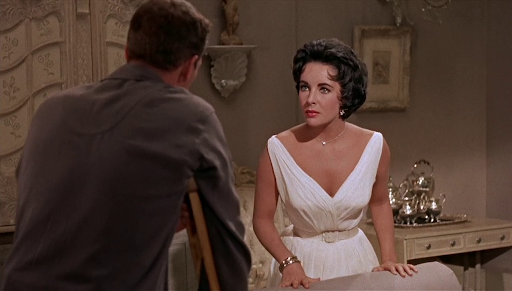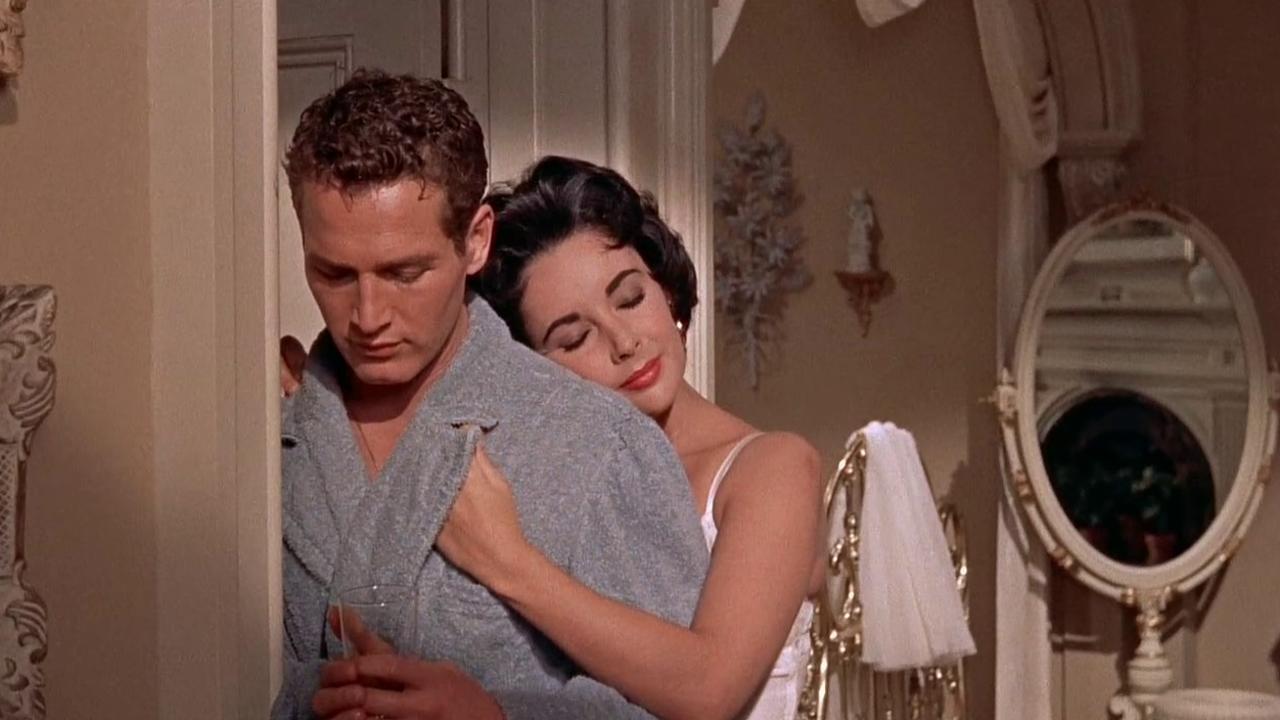Well, hey there, readers! How ya been? How has the season been treating you?
This time around, I thought it might be fun to think about a sweltering summer, full of passion and actors with absurdly colorful eyes. That’s right — we’re going to review Tennessee Williams’ (#OneOfuUs) Cat On A Hot Tin Roof.

This film encapsulates themes of truth and greed on a sweltering Mississippi day, focusing on a wealthy Southern family, their dynamics, and the fate of their fertile farmland. It stars Paul Newman and Elizabeth Taylor in their pretty, pretty prime; if nothing else, it’s fun to look at. But of course, we’re gonna go more than skin deep on this review.
I have to warn you ahead of time, readers. I mean, not only of SPOILERS or that the rating scale won’t make sense if you’re not already familiar with it (here’s a handy explanation for just that). Also, you can browse our Bi Media Entry for a quick summary of this film. But I’m gonna theorize here beyond the cinematic context. Some may claim I’m reaching with my assertions, while others might appreciate my insight, but this one is gonna get a little out there.
Hopefully, not tinfoil-hat level out there, but feel free to enjoy the ride.
What I Liked:
To understand my basis for arguing that Brick — in the film — is bi, we need to go back to the source material, the Pulitzer-Prize winning Broadway play. Of course, everyone knows that parts of stories change from stage to screen, and Cat On A Hot Tin Roof is no exception. In the original script, not only does Big Daddy die (offstage), but Maggie is much more on the nose about calling out Brick’s feelings and obsessions as homosexual, insinuating that Brick is gay. This seems valid, considering his response to Skipper’s death and the reveal that Skipper confessed his feelings for Brick on the phone before offing himself.
Of course, when this film went into production, America was still in Hays Code territory. (For the uninitiated, Hays Code was a morality clause that sanitized any sexual innuendo in mainstream films and removed hints of homosexuality. In short: a morality code of characters and stories were expected to adhere to for production and distribution.) Many writers and directors got creative to imply sex and orientations. (I always laugh at the end of North By Northwest when Cary Grant and Eva Marie Saint’s embrace smash-cuts to a train entering a tunnel. Got it, Hitch. We got it.)

So what is an actor like Newman, one of the best interpretive actors of his generation (and my personal favorite), gonna do when a script is completely neutered of homosexual undertones that drive the main conflict? And when Brick throws his pillow onto the bed, implying that he and Maggie will have sex after all, without total coercion by Maggie’s bluff? He takes all that gay longing for his dead friend, Skipper, all the mourning, all the anguish — and telegraphs it with his face, if not his words. Anyone with eyes watching this film can see that Brick is truly bereft at the loss of Skipper — and considering the source material, it’s easy to see why.
But hey, what about all those lines with Brick saying he can’t stand Maggie? That she repulses him? All right. Raise your hand if you’ve never said something in anger that you didn’t mean. Also, there’s no reason for Brick to bang Maggie at the end unless he wants to. He doesn’t have to out of obligation, as he has proven throughout the film. He seems genuinely turned on by how she stood up for the both of them. Also, since she cleared her name of blame for Skipper’s death, I think she absolved herself in Brick’s painfully blue eyes.
Also, there’s Newman’s personal life to consider. This may be a reach, but there has long been a rumor that he had a threesome with James Dean and Eartha Kitt. Don’t believe me? Let’s take a look at this audition tape featuring the two of them. There’s serious chemistry there. I think at one point, Newman even jokes, “Kiss me,” and Dean replies, “Can’t here.” All I’m saying is that it’s not outside of the realm of possibility.
So, yes. Even though it’s a compromised film, there’s a lot to love here. It was Williams’ favorite play, and I can see why. Between the themes of mendacity and avarice, the film gives the audience a lot to think about.
What I Didn’t Like:
What stood out to me in this viewing was the Jim Crow undercurrent throughout the movie. Most of the help was nameless and skirted around the edges of the story, even though the outcome would affect them perhaps most of all. Most of the time, the black actors didn’t even get to have their faces on screen, let alone any lines. I did appreciate that Brick pointed out this hypocrisy to Big Daddy in their final conflict. So yes, it’s a bunch of white people arguing over a piece of land and for their relationships, but it’s still a potent piece.
The Rating:
I have to throw this film into historical context to give it full consideration. Considering this is 1950s America, the depletion of overt homosexual overtones isn’t surprising. But I still think Newman and the production make it work, which is pretty remarkable considering its time. Cat On A Hot Tin Roof is still definitely worth a watch — if for no other reason than for someone to challenge me about my bi assertions. Come at me, Unicorns — I’m ready!
